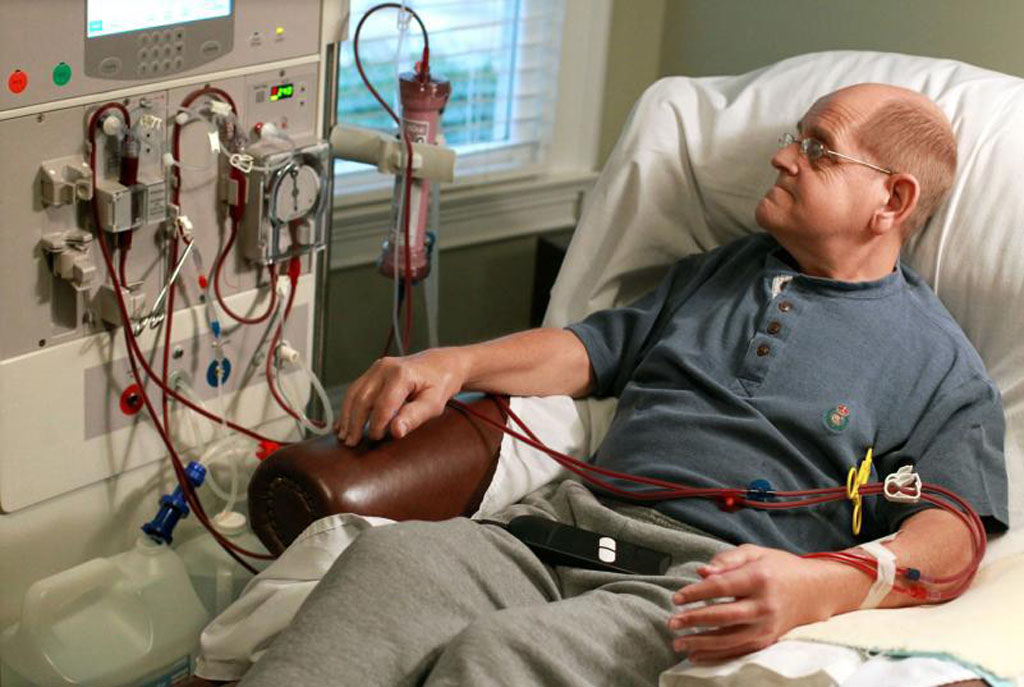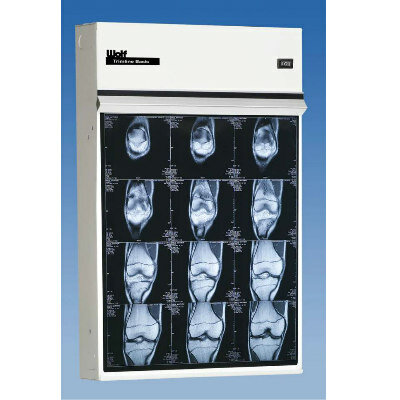Heart Failure Risk Outweighs Stroke in CKD Patients
|
By HospiMedica International staff writers Posted on 03 Jan 2017 |

Image: New research suggests chronic kidney disease patients face higher risk of cardiac problems (Photo courtesy of kidney-treatment.org).
Chronic kidney disease (CKD) patients are at a risk of heart failure (HF) that is as high as for coronary heart disease (CHD), whereas stroke risk is only slightly elevated, according to a new study.
Researchers at the University of Washington (UW; Seattle, USA), Tufts Medical Center (Boston, MA, USA), and other institutions conducted a study to determine absolute rates and comparative risk differences of incident HF, CHD, and stroke in CKD patients. In all, 14,462 participants were pooled from three studies: the Jackson Heart Study, the Cardiovascular Health Study, and the Multi-Ethnic Study of Atherosclerosis. Main outcome and measures were incidence rates (IRs) and risk differences comparing participants with and without CKD.
The results revealed that CKD patients had a 2.3 per 1,000 person-year greater risk than those without CKD for both HF and CHD. For stroke, the risk difference was 0.8 per 1,000 per person-year in CKD, versus no CKD. Risks were particularly high for African American and Hispanic participants, with adjusted risk differences in those with CKD for HF of 3.5 and 7.8 per 1,000 person-years, respectively. The study was published on December 21, 2016, in JAMA Cardiology.
“Cardiovascular disease is the leading cause of morbidity and mortality in patients with CKD. Understanding the relative contributions of cardiovascular disease event types to the excess burden of cardiovascular disease is important for developing effective strategies to improve outcomes,” concluded lead author Nisha Bansal, MD, MAS, of the UW Kidney Research Institute, and colleagues. “The excess risk of HF associated with CKD was particularly large among African American and Hispanic individuals. Efforts to improve health outcomes for patients with CKD should prioritize HF in addition to CHD prevention.”
CKD is the progressive loss of kidney function over a period of months or years, identified by the presence of creatinine, a breakdown product of muscle metabolism. Higher levels of creatinine indicate a lower glomerular filtration rate (GFR), resulting in a decreased capability of the kidneys to excrete waste products. Symptoms are not specific, and might include feeling generally unwell or a reduced appetite. Professional guidelines classify severity of CKD in five stages, culminating in end- end-stage renal disease (ESRD), a severe illness with poor life expectancy if left untreated.
Related Links:
University of Washington
Tufts Medical Center
Researchers at the University of Washington (UW; Seattle, USA), Tufts Medical Center (Boston, MA, USA), and other institutions conducted a study to determine absolute rates and comparative risk differences of incident HF, CHD, and stroke in CKD patients. In all, 14,462 participants were pooled from three studies: the Jackson Heart Study, the Cardiovascular Health Study, and the Multi-Ethnic Study of Atherosclerosis. Main outcome and measures were incidence rates (IRs) and risk differences comparing participants with and without CKD.
The results revealed that CKD patients had a 2.3 per 1,000 person-year greater risk than those without CKD for both HF and CHD. For stroke, the risk difference was 0.8 per 1,000 per person-year in CKD, versus no CKD. Risks were particularly high for African American and Hispanic participants, with adjusted risk differences in those with CKD for HF of 3.5 and 7.8 per 1,000 person-years, respectively. The study was published on December 21, 2016, in JAMA Cardiology.
“Cardiovascular disease is the leading cause of morbidity and mortality in patients with CKD. Understanding the relative contributions of cardiovascular disease event types to the excess burden of cardiovascular disease is important for developing effective strategies to improve outcomes,” concluded lead author Nisha Bansal, MD, MAS, of the UW Kidney Research Institute, and colleagues. “The excess risk of HF associated with CKD was particularly large among African American and Hispanic individuals. Efforts to improve health outcomes for patients with CKD should prioritize HF in addition to CHD prevention.”
CKD is the progressive loss of kidney function over a period of months or years, identified by the presence of creatinine, a breakdown product of muscle metabolism. Higher levels of creatinine indicate a lower glomerular filtration rate (GFR), resulting in a decreased capability of the kidneys to excrete waste products. Symptoms are not specific, and might include feeling generally unwell or a reduced appetite. Professional guidelines classify severity of CKD in five stages, culminating in end- end-stage renal disease (ESRD), a severe illness with poor life expectancy if left untreated.
Related Links:
University of Washington
Tufts Medical Center
Latest Critical Care News
- Peptide-Based Hydrogels Repair Damaged Organs and Tissues On-The-Spot
- One-Hour Endoscopic Procedure Could Eliminate Need for Insulin for Type 2 Diabetes
- AI Can Prioritize Emergecny Department Patients Requiring Urgent Treatment
- AI to Improve Diagnosis of Atrial Fibrillation
- Stretchable Microneedles to Help In Accurate Tracking of Abnormalities and Identifying Rapid Treatment
- Machine Learning Tool Identifies Rare, Undiagnosed Immune Disorders from Patient EHRs
- On-Skin Wearable Bioelectronic Device Paves Way for Intelligent Implants
- First-Of-Its-Kind Dissolvable Stent to Improve Outcomes for Patients with Severe PAD
- AI Brain-Age Estimation Technology Uses EEG Scans to Screen for Degenerative Diseases
- Wheeze-Counting Wearable Device Monitors Patient's Breathing In Real Time
- Wearable Multiplex Biosensors Could Revolutionize COPD Management
- New Low-Energy Defibrillation Method Controls Cardiac Arrhythmias
- New Machine Learning Models Help Predict Heart Disease Risk in Women
- Deep-Learning Model Predicts Arrhythmia 30 Minutes before Onset
- Breakthrough Technology Combines Detection and Treatment of Nerve-Related Disorders in Single Procedure
- Plasma Irradiation Promotes Faster Bone Healing
Channels
Artificial Intelligence
view channel
AI-Powered Algorithm to Revolutionize Detection of Atrial Fibrillation
Atrial fibrillation (AFib), a condition characterized by an irregular and often rapid heart rate, is linked to increased risks of stroke and heart failure. This is because the irregular heartbeat in AFib... Read more
AI Diagnostic Tool Accurately Detects Valvular Disorders Often Missed by Doctors
Doctors generally use stethoscopes to listen for the characteristic lub-dub sounds made by heart valves opening and closing. They also listen for less prominent sounds that indicate problems with these valves.... Read moreSurgical Techniques
view channelAI Assisted Reading Tool for Small Bowel Video Capsule Endoscopy Detects More Lesions
A revolutionary artificial intelligence (AI) technology that has proven faster and more accurate in diagnosing small bowel bleeding could transform gastrointestinal medicine. AnX Robotica (Plano, TX,... Read more
First-Ever Contact Force Pulsed Field Ablation System to Transform Treatment of Ventricular Arrhythmias
It is estimated that over 6 million patients in the US and Europe are affected by ventricular arrhythmias, which include conditions such as ventricular tachycardia (VT) and premature ventricular contractions (PVCs).... Read more
Caterpillar Robot with Built-In Steering System Crawls Easily Through Loops and Bends
Soft robots often face challenges in being guided effectively because adding steering mechanisms typically reduces their flexibility by increasing rigidity. Now, a team of engineers has combined ancient... Read more
Tiny Wraparound Electronic Implants to Revolutionize Treatment of Spinal Cord Injuries
The spinal cord functions as a vital conduit, transmitting nerve impulses to and from the brain, much like a highway. When the spinal cord is damaged, this flow of information is disrupted, leading to... Read morePatient Care
view channelFirst-Of-Its-Kind Portable Germicidal Light Technology Disinfects High-Touch Clinical Surfaces in Seconds
Reducing healthcare-acquired infections (HAIs) remains a pressing issue within global healthcare systems. In the United States alone, 1.7 million patients contract HAIs annually, leading to approximately... Read more
Surgical Capacity Optimization Solution Helps Hospitals Boost OR Utilization
An innovative solution has the capability to transform surgical capacity utilization by targeting the root cause of surgical block time inefficiencies. Fujitsu Limited’s (Tokyo, Japan) Surgical Capacity... Read more
Game-Changing Innovation in Surgical Instrument Sterilization Significantly Improves OR Throughput
A groundbreaking innovation enables hospitals to significantly improve instrument processing time and throughput in operating rooms (ORs) and sterile processing departments. Turbett Surgical, Inc.... Read moreHealth IT
view channel
Machine Learning Model Improves Mortality Risk Prediction for Cardiac Surgery Patients
Machine learning algorithms have been deployed to create predictive models in various medical fields, with some demonstrating improved outcomes compared to their standard-of-care counterparts.... Read more
Strategic Collaboration to Develop and Integrate Generative AI into Healthcare
Top industry experts have underscored the immediate requirement for healthcare systems and hospitals to respond to severe cost and margin pressures. Close to half of U.S. hospitals ended 2022 in the red... Read more
AI-Enabled Operating Rooms Solution Helps Hospitals Maximize Utilization and Unlock Capacity
For healthcare organizations, optimizing operating room (OR) utilization during prime time hours is a complex challenge. Surgeons and clinics face difficulties in finding available slots for booking cases,... Read more
AI Predicts Pancreatic Cancer Three Years before Diagnosis from Patients’ Medical Records
Screening for common cancers like breast, cervix, and prostate cancer relies on relatively simple and highly effective techniques, such as mammograms, Pap smears, and blood tests. These methods have revolutionized... Read morePoint of Care
view channel
Critical Bleeding Management System to Help Hospitals Further Standardize Viscoelastic Testing
Surgical procedures are often accompanied by significant blood loss and the subsequent high likelihood of the need for allogeneic blood transfusions. These transfusions, while critical, are linked to various... Read more
Point of Care HIV Test Enables Early Infection Diagnosis for Infants
Early diagnosis and initiation of treatment are crucial for the survival of infants infected with HIV (human immunodeficiency virus). Without treatment, approximately 50% of infants who acquire HIV during... Read more
Whole Blood Rapid Test Aids Assessment of Concussion at Patient's Bedside
In the United States annually, approximately five million individuals seek emergency department care for traumatic brain injuries (TBIs), yet over half of those suspecting a concussion may never get it checked.... Read more
New Generation Glucose Hospital Meter System Ensures Accurate, Interference-Free and Safe Use
A new generation glucose hospital meter system now comes with several features that make hospital glucose testing easier and more secure while continuing to offer accuracy, freedom from interference, and... Read moreBusiness
view channel
Johnson & Johnson Acquires Cardiovascular Medical Device Company Shockwave Medical
Johnson & Johnson (New Brunswick, N.J., USA) and Shockwave Medical (Santa Clara, CA, USA) have entered into a definitive agreement under which Johnson & Johnson will acquire all of Shockwave’s... Read more















